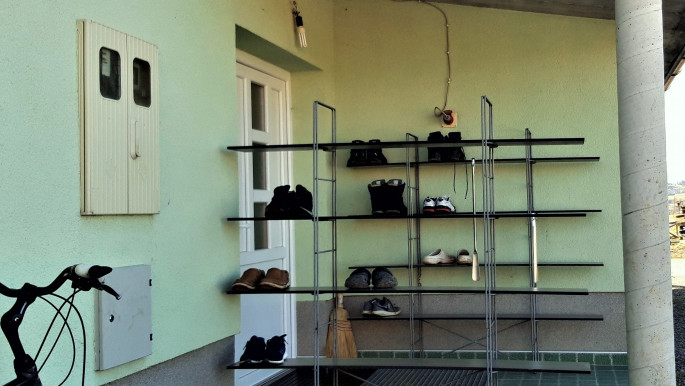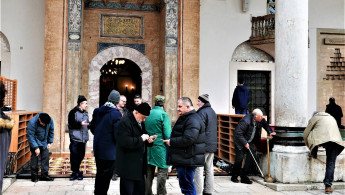No, radical Islam has not taken root in Bosnia
Only at noon when its loudspeakers spread the adhan, or call to prayer, in the valley does it become evident that the house is actually a mosque.
Several men, all wearing short pants, round caps and with long beards, arrive at the mosque. They politely refuse to make a statement, and point to the imam, a shorter and older man, as their spokesperson.
"Go away right away! I don't want you here!", the imam shouted as soon as he heard the word 'journalist', just before adding an insult.
Salafist communities such as the one in Stijena feel under pressure after French President Emmanuel Macron described Bosnia and Herzegovina as a "ticking time-bomb" and the greatest concern for Europe in the Balkans due to radical Islamists.
His comments followed several statements by Croatian and Serbian politicians depicting the country as a "jihadist hub".
Former Croatian President Kolinda Grabar-Kitarovic even claimed that Bosnia harbours 10,000 radicals, a serious stain on a country that it is trying to join the European Union.
"Those claims are completely false. We don't have a radicalisation problem. We may have dozens of extremists, but not more," assures Halid Genjac, General Secretary of the SDA (Party of Democratic Action), the main party among Bosniaks, a term used to designate Muslim citizens in Bosnia and Herzegovina.
According to the last census, Bosniaks account for slightly over 50 percent of the population, while Serbs are 30 percent, and Croats 15 percent.
 |
Islam adopted a more prominent role within Bosnian society after the bloody civil war the country went through between 1992 and 1995 |  |
"During the war in the nineties, 100,000 Bosniaks were killed and thousands of women were raped. But there has not been a single act of revenge. Would that be possible if jihad was preached in our mosques," Genjac retorts emphatically, arguing that alarming comments by Serbian and Croatian politicians aim to weaken Bosnia in order to split it along ethnic lines in the future.
Between 220 and 330 Bosnian citizens joined jihadist groups in Syria and Iraq, roughly 0.018 percent of Bosniaks living in the country.
Read more: Can Bosnia's path to peace be replicated in the Middle East?
That percentage is almost half of the number registered among the French Muslim population (0.034 percent). As for the number of returned foreign fighters, there are around 60, while in France the number exceeds 300. Therefore, the alarmist statements do not seem justified.
Moreover, Bosnian religious authorities have always confronted radical interpretations of Islam.
"When Bilal Bosnic's issue [a Salafist-jihadist preacher who was sentenced in 2015 to seven years in prison for public incitement to terrorist activities] came up, our Mufti Husein Kavazovic, publicly denounced the jihadist ideology. And he immediately invited all Salafist groups to join the Islamic community mosques and embrace their values," said Said Mujakic, the main imam of Cazin municipality, to which Stijena belongs.
 |
|
| Salafis pray in unofficial mosques in Bosnia [Ricard Gonzalez] |
According to Mukajic, there are twenty-nine small Salafist communities in Bosnia and Herzegovina. Most of them pray in unofficial mosques, such as the one in Stijena. They live isolated from the rest of the Islamic community and they don't usually engage in proselytising.
"Here, there are only a few Wahhabi families. They have always lived in the village. A few years ago, they embraced this ideology and they stopped mixing with the rest of the population," an old farmer who lives a few meters away from the 'green house' in Stijena tells The New Arab.
Read more: Genocide denier Peter Handke's Nobel Prize embodies Europe's Islamophobia
"They don't make any problem. They just live their lives according to their principles," he adds.
Islam adopted a more prominent role within Bosnian society after the bloody civil war the country went through between 1992 and 1995.
Compared to the Communist period, when religiosity was discouraged by the state, attendance at mosques increased after the conflict. For Bosniaks, even those who were not religious, Islam became a stronger element of their identity.
However, radical interpretations never took root in the country.
 |
Bosnian religious authorities have always confronted radical interpretations of Islam |  |
Salafism arrived to Bosnia during the war by means of a few hundred mujahideen who came straight from the battlefields of Afghanistan. When the war was over, some of them decided to stay in Bosnia and established several communities in rural areas.
Other Salafist groups, such as the one in Stijena, are much more recent. Some Bosnian immigrants set them up after coming back from Western countries, where they were exposed to these ideas.
Although most of these communities are quiet, the majority of the radicalised youth who travelled to Syria and Iraq belonged to them, according to Matteo Pugliese, a researcher for the Institute for International Political Studies (ISPI).
"For the last 150 years, Bosnian Muslims have practiced a liberal interpretation of Islam. When the Ottomans lost the control of this territory, we faced and answered the same questions that Muslims from other regions face nowadays," Sumeja Ljevakovic, a researcher from the Institute of Bosniak Islamic Tradition (IITB) in Sarajevo, told TNA.
Several members of the IITB have expressed concern for the damage caused to Bosnia's reputation by some statements from foreign politicians.
"Do you feel Bosnia is an extremist country, while walking through Sarajevo?", another researcher at the institute asked.
Ricard Gonzalez is a freelance journalist covering Mediterranean and Arab countries, previously based in Egypt and Tunisia. Follow him on Twitter: @RicardGonz



